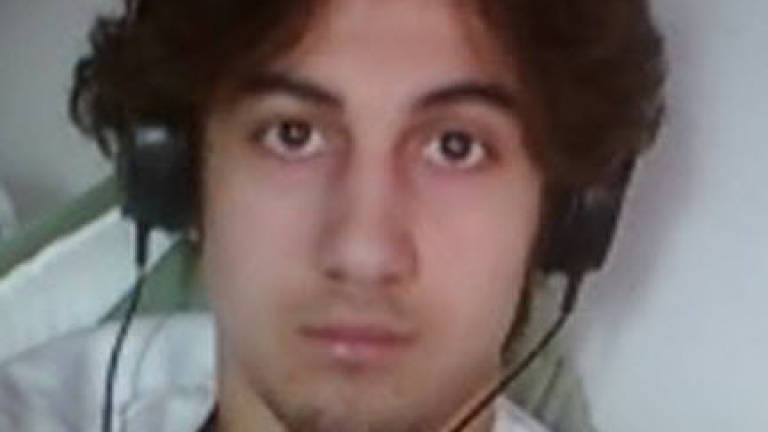Fate of Boston bomber entrusted to US jury

BOSTON: The fate of Boston bomber Dzhokhar Tsarnaev (pix) will be entrusted to jurors Tuesday when they start deliberating the guilt of the 21-year-old American accused of carrying out the deadly 2013 attacks.
Three people were killed and 264 others wounded in the twin blasts at the city's marathon, the worst attack in the United States since the Sept 11, 2001 attacks on New York, Washington and Pennsylvania.
Government prosecutors portrayed the Muslim immigrant, who became a US citizen in 2012, as a callous terrorist who carried out the bombings to bring holy war to the northeastern US city and punish the United States.
Tsarnaev's lawyers admit that he planted one of the bombs, but have portrayed him as a feckless accomplice, bullied or manipulated into taking part by his more radical elder brother.
From Tuesday, the jury must decide whether Tsarnaev is guilty on 30 counts related to the April 15, 2013 attacks, and the subsequent murder of a police officer, a car jacking and a shootout with police while on the run.
Seventeen of those charges carry the possibility of the death penalty.
The first stage of the one-month trial wrapped up Monday with closing statements from the government and the defense, and lengthy jury instructions from federal Judge George O'Toole.
If Tsarnaev is convicted, the trial will enter a second stage, when the jury determines whether he should be executed or spend the rest of his life behind bars without parole – the only sentencing options available.
Prosecutors spent four weeks building their case, calling 92 witnesses in an effort to paint Tsarnaev as an active and willing bomber alongside his elder brother, who was killed by police while on the run.
'Wanted to punish America'
"He wanted to terrorise this country. He wanted to punish America for what it was doing to his people," assistant US attorney Aloke Chakravarty told the court in an emotional closing statement on Monday.
"That day they felt they were soldiers, that they were mujahideen and they were bringing their battle to Boston," added Chakravarty.
They portrayed a cold, callous killer – a marijuana-smoking, laid-back student who had recently failed a number of exams and become an avid reader of the Islamist literature that investigators found on his computer.
They claimed he was self-radicalised as early as high school, plotted the attacks up to a year in advance and was influenced by the teachings of US-Yemen cleric Anwar al-Awlaki, who was killed in a drone strike in 2011.
The prosecution showed the jury photographs and videos, filling the court with the screams of victims, the sight of blood, and the panic, fear and chaos after the bombings.
"This was a cold, calculated terrorist act. It was intentional. It was bloodthirsty," said Chakravarty.
Prosecutors say the brothers carried out the attacks as partners to avenge the deaths of fellow Muslims overseas after learning how to build pressure-cooker bombs through Al-Qaeda English-language magazine "Inspire."
He emphasised the appalling injuries that killed eight-year-old Martin Richard, Krystle Campbell, 29, and Lingzi Lu, 23, and the murder of police officer Sean Collier, who was shot five times.
Martin's father sat in the gallery as Chakravarty described how his son was torn apart in the explosion.
"His entire body was shattered, broken, eviscerated, burnt. There wasn't a part of his body that wasn't destroyed."
Milk and Twitter
Just minutes later, Tsarnaev casually bought milk, then headed to the gym, laughing and joking with friends and posting a message on Twitter calling himself a "stress free kind of guy," prosecutors said.
Chakravarty read aloud from a message he left in a boat in a suburban garden, the hideout where the defendant was eventually arrested, criticising the US government over the wars in Iraq and Afghanistan.
Defense lawyer Judy Clarke, who has saved some of America's most notorious convicts from the death penalty, said Tsarnaev deserved to be condemned but that the attacks would never have happened without Tamerlan.
"The last few weeks we have come face to face with tragedy, suffering and grief in dimensions that none of us imagine could be possible," she said.
"For this suffering, destruction and profound loss there is no excuse. No one is trying to make one," she added.
Tamerlan built the bombs, murdered Collier, downloaded the bomb-making instructions, brought the ingredients, the backpacks and his fingerprints were all over the evidence, Clarke said.
"Let's be honest about what the evidence actually shows," Clarke said.
"Let's look at the varying roles."
Massachusetts has not executed anyone since 1947, and Roman Catholic bishops in the state on Monday reiterated their opposition to the death penalty. – AFP